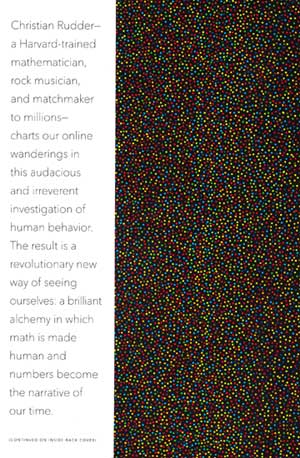It's lies. All damn lies until you strip out the names and aggregate the data to well over a thousand points and samples. Then you have a truth and see what trends are really going on. What lies beneath the lies.
Pulling data mostly from OkCupid, Dataclysm examines, through a lucid divination of profile answers and search preferences, the lies we tell ourselves and the lies we tell others. Basically, uncovering the biases, predilections and prejudices within. Those which we don't know we're letting on.
Dataclysm starts off with the gloss of dating profiles, and takes a macro view trying to discern what it can discern. Learning as much about human nature as it does by way of how we talk to each other and dress ourselves verbally. Those words and missives shooting back and forth to present an ideal and all its insecurities.
If you have been reading OkTrends, also by Christian Rudder, none of this will really be anything new. Couch one set of subconscious thoughts, couch them all. Still, it does make for a chewable, eye-opening read.
Halfway through it moves outside the realm of dating and into other social networks like Twitter and Facebook. Scraping data from there, the bulk remains at looking at men versus women and the four major food group ethnic clumps (Caucasian, Hispanic, Black and Asian).
What do we really leave behind when we join up with so many social networks and profile harvesters? When we put so much of our digital lives out there, what kind of tells and truths are you leaving in your breadcrumbs as you expose yourself to data miners? So much. Enough to predict if you're actually gay, Black American, or that you're about to drop one out kicking and screaming vaginally.
About three quarters of the way through the book, after ruminating, poring and dissecting the sexes and the ethnics, it peters out into a chapter on brand management. Clunk.
Rudder does a neat craft of dressing up the data and cutting right through it. Quite the dry voice, but there's a hint of whimsy there, a bit of humour in detailing where and why the plot points fall as they may. There's not much need for extrapolation, as there's plenty right in the meat already there. It's a thick bed of data to crunch and marvel at how exposed everything becomes from it. The writing around the graphs is smooth velvet.
Data is about how we're really feeling—feeling about one another, yes, but also about ourselves. If it finds divides in our culture, our politics, our habits, our tribes, it finds divides within us, too. And that's a hopeful thought, because for anything to be made whole, the first step is to know what is missing.
Dataclysm: Who We Are (When We Think No One's Looking) is interesting and a breezy read. It's not all about dating profiles and the garble that lines the About Me text, but it doesn't feel like it strays that far from it either.

The publisher provided a review copy
Reviewed on Monday, 8 September 2014
